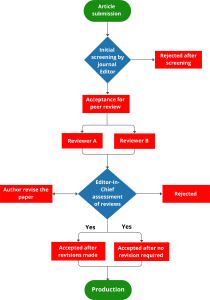Peer review policy

Journal uses double-blind peer review process, which means that both the reviewers and author(s) identities are concealed from the reviewers, and vice versa, throughout the review process. This means that the reviewers of the manuscript would not get to know the identity of the author(s), and the author(s) would not get to know the identity of the reviewers. Reviewers have no relationship to the author(s) and/or research that would affect the objectivity of the peer review process. Reviewers are independent of the author(s) i.e. not affiliated with the same institution. Peer review helps validate research, establish a method by which it can be evaluated, and increase networking possibilities within research communities. Journal is following COPE Guidelines.
Points of Review Policy:
The Editorial Board has the authority to reject substandard manuscripts without providing any explanation.
All submitted manuscripts are treated as confidential documents. All submitted manuscripts will be reviewed by double blind review process.
The manuscript will be send to the two reviewers simultaneously for blind review and the remarks/modifications/amendments (if any) will be send to the author for further changes in manuscript by Editor-in-Chief.
The author will re-submit the modified/amended manuscript to the Journal Editorial Board within stipulated time.
The Editorial Board will verify whether the required remarks/ modifications/amendments are fulfilled by the author or not. If yes, the author will receive the acceptance by Editorial Board. If not, the manuscript will further sent to the author unless or until it is well modified.
Authors will be informed by Editorial Board if further review is required in manuscript. All publication decisions are made by the Journal’s Editorial Board on the basis of the reviewer’s report.
If the manuscript is found to be plagiarized beyond the acceptable limits at the time of submission, the journal Editorial Board will contact the author(s).
If any discrepancies or conflicts are identified in the manuscript after publication, the Editor-in-Chief will initiate an inquiry with the assistance of an appropriate committee specifically formed for this purpose. A decision will then be taken based on the findings of the investigation.


